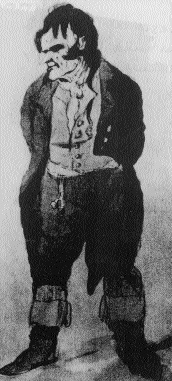Thomas Russell, librarian
Published in 18th–19th - Century History, Features, Issue 3 (Autumn 2003), The United Irishmen, Volume 11Few have shown such lack of enthusiasm for appointment as a librarian as Thomas Russell! He was with Wolfe Tone in Dublin when he heard the news on 17 January 1794: ‘Find I am ele[c]ted to the librarianship at Belfast, which [Wolfe Tone] and [Whitley] Stokes have put me out of conceit of’. Russell’s radical and revolutionary friends in Belfast thought that they had found him a suitable position. In this most radical of towns, the Belfast Society for Promoting Knowledge was the most radical of libraries. Founded in 1788 as the Belfast Reading Society by ‘worthy plebeians’ or ‘sansculottes’, as contemporary accounts have it, it was soon enough colonised by the merchants, who gave it its more grandiose title, implying a whole Enlightenment agenda.
It was to be library, museum and centre for learned correspondence. Women were members, and the Society advocated immediate Catholic Emancipation. Supreme authority within the organisation lay with a three-monthly general meeting, with officers elected annually and a committee elected every three months. And yet the office of librarian was less than enticing. The resolution appointing Russell determined that ‘the expense attending a house for the library, museum & c. & the librarian’s salary shall not exceed thirty pounds per annum’. It was not enough for one who, as he walked north, concluded that he had ‘ruined myself—for the good of my country’. Furthermore, the librarian’s role, as defined in printed rules, was limited to maintaining the routines of the library. The officers and committee carried out all the executive functions subject to the democracy of the general meeting. The librarian lay beneath them as a servant.

The Library minutes of the meeting following Russell’s arrest on 16 September 1796-a masterpiece of understatement. (Linen Hall Library)
On arrival in Belfast, Russell ‘on consulting [William] Sinclair, [Robert] Simms, etc. etc., accept[ed] the place [i.e. the librarianship]’. Sinclair and Simms were both leading United Irishmen on the committee. They may well have urged the strategic importance of the appointment. The titular president of the Society, Alexander Halliday, and the more active vice-president, the Revd William Bruce, were both opponents of the United Irishmen—Tone described the latter as ‘an intolerant high priest’. By contrast, United Irish sympathisers enjoyed a slight preponderance on the rotating committee, and Russell’s appointment would strengthen their hand.
More persuasively Russell noted, ‘I am to be paid by my friends £50 per annum’, a considerable improvement on the original offer. The need for Russell to provide an unspecified security before commencing, and the fact that he was paid six months in arrears, help to explain his continuing poverty. In November 1794 he noted: ‘my situation is not at present pleasing and [I] see no effort of mine that can better it’. Although Russell, as librarian, was expected to attend all meetings of the Society ‘under penalty of double fines’, there is little evidence either in the minutes or in his journal of his playing any instrumental role. It is true that in February 1794, soon after his appointment, his proposal for taking on premises in Anne Street was accepted. In November 1794 he composed a letter for Edward Bunting calculated to encourage the Society to proceed with the publication of Bunting’s Ancient Irish music. This was successful, but the indirect approach suggests how limited Russell’s direct influence was.
Beyond that point the Society’s minutes increasingly ‘instruct’ him. In November 1795 Bruce and one other are appointed to ‘form a register for the librarian’, and in December it is ‘ordered that the librarian do use [it] immediately’—the tone is clear! More seriously, in May 1796 Dr White, otherwise in the radical camp, proposed a draconian system of inspection. Every year three members were to be chosen by ballot as inspectors:
Whose duty shall be to examine and report on the state of the stock—whether the books are in good order and whether the stock as purchased or proposed by the Society is intact and to remark whether any books are lost or unaccounted for.
The inspectors were to provide a ‘written report’ to a general meeting. The potential consequences of any adverse findings were laid out in the existing regulations, under which the librarian was ‘accountable’ for any losses arising from ‘neglect’.

Thomas Russell caricatured as ‘The Librarian at Belfast’. (Linen Hall Library)
The June general meeting approved this scheme, with William Bruce appointed to lead the inspectors. It is a reasonable deduction that the measure was a response to Russell’s perceived shortcomings as librarian. Certainly his increasingly important role as a United Irish commander, and his efforts as a political propagandist, increasingly distracted him from the mundane duties of librarian. Harassment there was a petty matter to one contemplating revolution!
On 16 September 1796 he was arrested on the Society’s premises. The minutes of the following meeting of the committee are a masterpiece of understatement: ‘In consequence of the absence of the librarian, Mr Russell, Mr McCoughtry offered his services to the Society for that duty until Mr Russell’s return’. Of course, through long imprisonment and his fatal involvement in Emmet’s rebellion, he never did return. But even in prison he remained concerned about the library. When his friend, the naturalist John Templeton, wrote to him in September 1797 describing the ‘declining state’ of the Society and efforts to revive it, Russell responded: ‘I am very glad that the library is still afloat. I am sure it will, ultimately, be a fine institution for the province, and perhaps the whole country’.
John Gray is Librarian of the Linen Hall Library, Belfast.
















